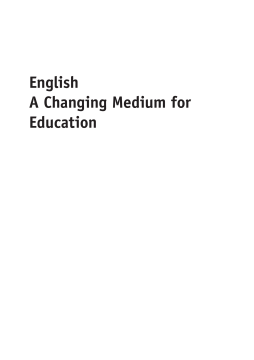
Additional Information
Book Details
Abstract
In this volume a range of authors from different international contexts argue that the notion of communicative competence in English, hitherto largely referenced to metropolitan native-speaker norms, has to be expanded to take account of diverse contexts of use for a variety of purposes. It also discusses the popular belief that language and literacy should simply be regarded as a technical 'skill' which confers universal benefits and that it should be replaced with a social practice view that recognises situated variations and diversity. This volume, we believe, provides a reference point for extended research and practice in these areas that will be of interest to wide range of people engaged in language and literacy education.
Current views of languages and literacies as situated social practices call for reconfigured language policies and instructional practices. This volume brings together the work of leading scholars to provide the foundational theoretical background that establishes that languages and literacies are shifting, evanescent, responsive to context and politically and economically located. As well, the authors present critical theoretical analyses of historical and contemporary policies in globally diverse areas and imagine how social practice views might provide enhanced access to communication for those historically denied such access. Critical and constructive, lively and engaging, the book will be of wide interest to scholars and graduate students and will be essential in the developing scholarship on social practice-oriented conceptualizations of languages and literacies.
Kelleen Toohey, Simon Fraser University, Canada
This welcome and elegant collection challenges the conception of languages as stable and reified entities. Interrogating what English is, the notion of communicative competence and the way it falls short in English teaching pedagogies, contributors argue convincingly for a view of language as social practice and outline inspiring examples of the pedagogical implications of this view of language.
Catherine Kell, University of the Western Cape, South Africa
Constant Leung is Professor of Educational Linguistics in the Centre for Language Discourse and Communication, Department of Education and Professional Studies at King's College London. He also serves as Deputy Head of Department. His research interests include additional/second language curriculum, language assessment, language education in ethnically and linguistically diverse societies, language policy, and teacher professional development. He is Associate Editor for Language Assessment Quarterly and Editor of Research Issues for TESOL Quarterly.
Brian V Street is Emeritus Professor of Language in Education at King's College, London University and Visiting Professor of Education in the Graduate School of Education, University of Pennsylvania. He has a commitment to linking ethnographic-style research on the cultural dimension of language and literacy with contemporary practice in education and in development. Over the past 25 years he has undertaken anthropological field research and been consultant to projects in these fields in countries of both the North and South (e.g. Nepal, S. Africa, India, USA, UK). He has published 18 books and 120 scholarly papers.
This book can be regarded as a timely addition to the emerging literature on language and literacy education. This excellent volume will be of great value, not only to researchers and students of language education, but also to language policy-makers and teaching professionals in schools or universities.
Zhang Kun, University of Hong Kong
Table of Contents
| Section Title | Page | Action | Price |
|---|---|---|---|
| Contents | v | ||
| Contributors | vii | ||
| Preface | xi | ||
| 1 Introduction: English in the Curriculum – Norms and Practices | 1 | ||
| 2 What Counts as English? | 22 | ||
| 3 The Rise and Rise of English: The Politics of Bilingual Education in Australia’s Remote Indigenous Schools | 41 | ||
| 4 (Re)Writing English: Putting English in Translation | 59 | ||
| 5 Multilingual and Multimodal Resources in Genre-based Pedagogical Approaches to L2 English Content Classrooms | 79 | ||
| 6 Multimodal Literacies and Assessment: Uncharted Challenges in the English Classroom | 104 | ||
| 7 Beyond Labels and Categories in English Language Teaching: Critical Reflections on Popular Conceptualizations | 129 | ||
| Concluding Remarks | 150 | ||
| Index | 152 |
